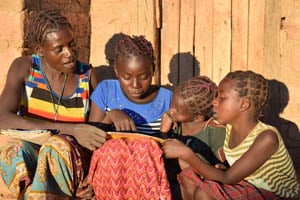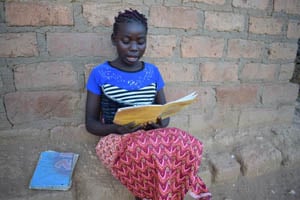Seated on the ground, 13-year-old Ivy eloquently reads a book in her mother tongue as she leans against the wall of a small mudbrick house in southern Zambia’s Moyo community. In the day’s twilight, the sun pleasantly beams onto her face in beautiful gold.
Ivy has mastered reading despite now having to learn on her own due to the impact of the coronavirus. Ivy and about 100 other children in her village used to meet at a reading camp—established with the help of World Vision—where they learned to read, write and play.
Now, they can no longer do so. “We had been used to gathering every weekend to learn and play at the reading camp together with friends but not anymore. Every-one is at home reading on their own; schools are still closed. I am worried because I don’t think we’ll get back to school any-time soon,” says Ivy, who is in Grade 5.
“If this disease doesn’t end soon, I fear my education will end. I don’t want to stop school like all my eldest siblings, who never wanted to be educated. Had they been educated, they would have jobs now to help us come out of suffering,” says Ivy, who is the fifth in a family of eight. “We struggle to find food, proper clothes and bedding unless World Vision helps us.” She looks down as she scribbles on the ground with a small stick, drops of tears falling as she recounts her pain and fears.
“If schools don’t close forever, I want to be the first child to finish school in our family—to become a nurse who would help everybody, and ensure I end the suffering of my family,” Ivy says. But not all is lost because of the coronavirus. Ivy has found hope in the radio education programs that World Vision is supporting, as well as from the community reading camp library the organization established thanks to donors. Now, Ivy and many other rural children are continuing to learn.
 “Because I am learning through radio and borrowing books to read, I believe we’ll go back to school one day,” she says. “I am reading a lot using the knowledge I obtained from the reading camp, and I am teaching my siblings and parents who do not know how to read. As I am teaching them, I am polishing my reading skills every day.” She adds, “Where I struggle to read or understand, I ask our reading camp facilitator who visits us to monitor how we are progressing.”
“Because I am learning through radio and borrowing books to read, I believe we’ll go back to school one day,” she says. “I am reading a lot using the knowledge I obtained from the reading camp, and I am teaching my siblings and parents who do not know how to read. As I am teaching them, I am polishing my reading skills every day.” She adds, “Where I struggle to read or understand, I ask our reading camp facilitator who visits us to monitor how we are progressing.”
Ivy’s mother, Vaidah Munyumbwe, 42, thanks World Vision for introducing reading camps and for supporting radio learning. She says, “Ivy is the first person in the family to know how to read ever. I am proud of her; I know she will achieve her dreams and save us from suffering.”








